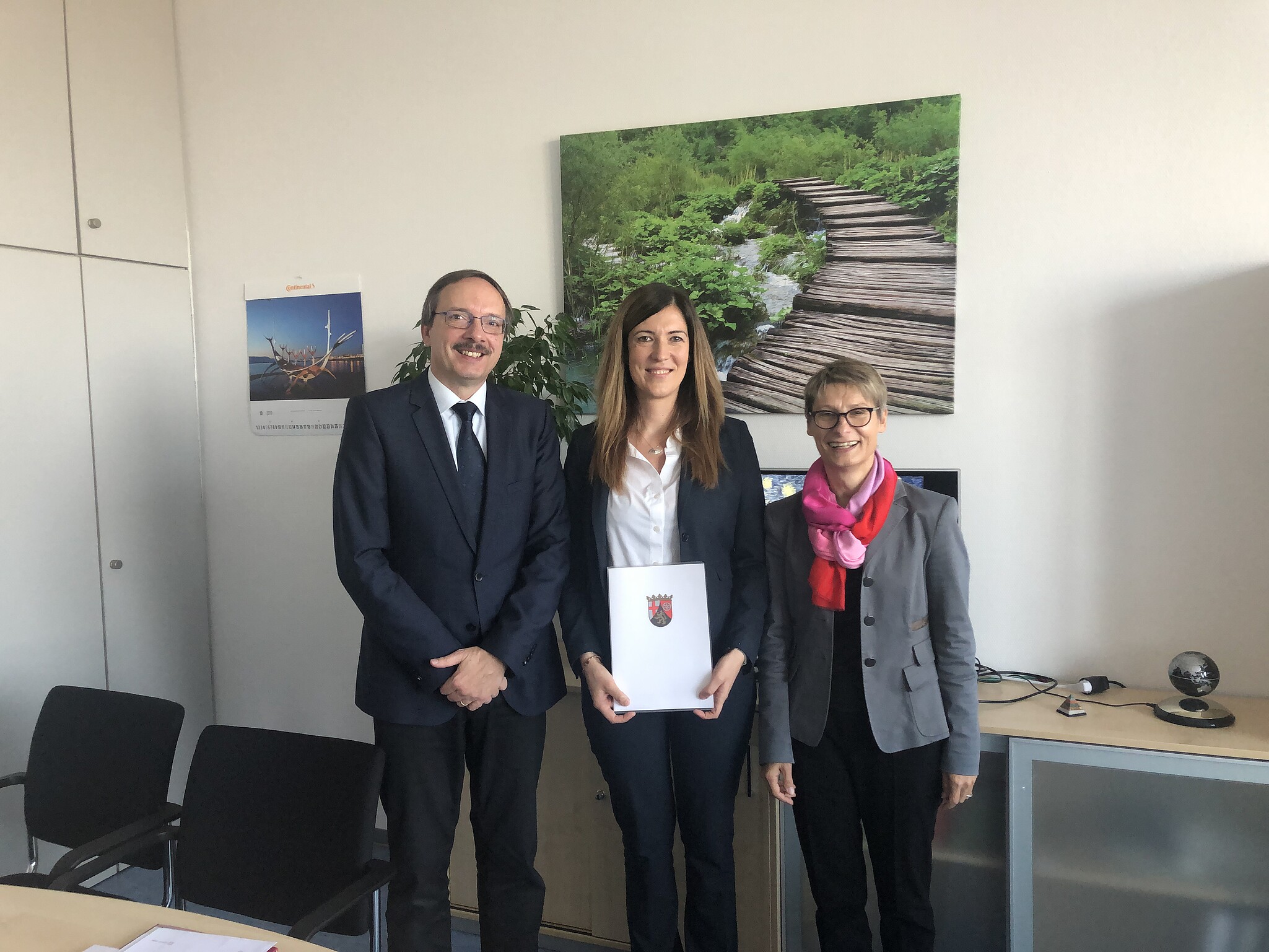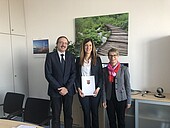Since 1 November 2019, Dr Jasmina Stoebel has held the Chair of Organization, in particular Process Management in Healthcare at the Department of Management, Controlling and HealthCare. In addition to research and education in these fields, Jasmina Stoebel's work will focus on future topics such as digitalization and innovation in healthcare as well as agile organizations and change management. Before joining the university in Ludwigshafen, Jasmina Stoebel held various positions at Roche Diagnostics, both in Germany and internationally, where she gained valuable experience in the healthcare sector. Most recently, as Head of Market Access, she was responsible for the successful implementation of innovative diagnostic markers for the optimization of medical processes in hospitals and private practices. We spoke to Professor Dr. Jasmina Stoebel about her professional career, the international experience she wants to bring to research and education and her enthusiasm for practical relevance.
After a very good Abitur, you didn't choose to go to university, but opted for the Technische Hochschule Mittelhessen in Giessen to study bioinformatics. What made you do this?
Jasmina Stoebel: At the time, it was very important for me to spend my time studying in a way that was as practical as possible and to work on challenging issues in small groups. Overcrowded lecture halls in large universities and a lack of contact with teaching staff didn't fit in with my image. The conditions at the technical university, which was a manageable size, were better suited to me. Fortunately, I often had lecturers who presented practical case studies, giving us students the opportunity to get a more concrete idea of what we would be able to do with what we had learned. In a subject as interdisciplinary as bioinformatics, this is particularly useful. I was able to write my diploma thesis at the Max Planck Institute (MPI) in Tübingen, which also opened up many interesting new perspectives for me and for which I am still grateful to the professors involved today.
And then you obviously brought internationality into your life. What were the main steps in this process?
A scholarship from the RIKEN Institute brought me to Japan. As a visiting scientist, I was able to spend a year at the RIKEN Genomic Sciences Centre in 2005 researching and publishing in the fields of big data/digitization. At this time, I felt the desire to follow up my scientific work with a doctorate. At the time, however, this was not an option for graduates of universities of applied sciences. However, accepting such a hurdle was out of the question for me, so I decided to look for alternative options. As I wanted to do my doctorate abroad, it was an advantage that I already had good contacts in England through my diploma thesis, which I then intensified. After a personal visit to Oxford and the discussion of my thesis in front of the selection committee, I received a personal confirmation from my future doctoral supervisor. This meant that nothing stood in the way of a doctorate abroad, apart from the financial challenge of this project. Due to my very good results, I was able to apply for a scholarship. As a scholarship holder of the German National Academic Foundation, I began my doctorate in bioinformatics at the University of Oxford in 2006, which I completed in 2008 with a doctorate in philosophy (PhD).
This path was certainly not an easy one for a young woman and certainly required some courage. What gave you the strength you needed?
I have to admit that the start in Japan in particular was very challenging. The foreign characters and the unfamiliar East Asian culture made the first few weeks no walk in the park. In addition, I had a clearly defined task at the institute that had to be completed within a year. There were also days when I was homesick. A strong will and the belief that I could achieve the goals I had set myself kept me going and gave me the strength I needed. My family has also always supported me with their positive energy. It is particularly important to have a harmonious private environment in such situations.
The two and a half years of my doctorate in Oxford, on the other hand, were almost like a home game. Here, I drew my motivation from the inspiring environment of excellent lecturers and an outstanding infrastructure. But here, too, you have to work hard to achieve something and not give up too quickly. With enough perseverance, doors will suddenly open that were firmly closed in the past.
After this degree, further paths in research and education would certainly have been open to you. What prevented you from doing so?
As with my decision to go to a university of applied sciences after my A-levels, I also decided to go into a practical world after my doctorate. This initially included a one-year phase at the Collège des Ingénieurs, Paris, France, leading to a Master of Business Administration (MBA) degree. The focus of my work was on corporate management, finance, economics and marketing & strategy.
Naturally, I wanted to apply this and began my professional career in the international talent program "Perspectives" at Roche Diagnostics. After stops in Switzerland and Sweden, I moved to the USA at the end of 2011. But before that, the biggest event of my life so far took place: the birth of our son Paul-Magnus.
As Project Manager Global Pricing Strategy for Roche Molecular Diagnostics, my analytical skills were in particular demand. I was then given the task of leading Global Marketing and Product Management at Roche Sequencing Solutions. This role brought me closer to gene sequencing/bioinformatics again. On the other hand, I was able to apply my knowledge in classic business fields.
Until mid-2015, I was responsible for Blood Screening as International Business Leader. In this area, you learn a lot about the processes of large blood donation organizations.
And your conclusion regarding these numerous international experiences?
These experiences are of course very enriching for my family and me. I wouldn't want to miss any of them. As always, the trick is to pick out and reinforce the positive aspects and to ignore the others. With the Americans, their openness to approaching new things and trying things out is simply captivating. This approach is also finding more and more supporters in Germany. The best example is the widely used sprint methods in projects. These elements will also find their place in my lectures and seminars.
What prompted you to leave your successful career in industry and devote yourself to research and education?
When I was given the opportunity to take over as Head of Market Access and Health Economics in the German organization of Roche Diagnostics in 2015, I didn't hesitate for a moment. Innovation in healthcare is not only dependent on developing and offering new products and procedures that have the potential to optimize patient treatment or bring economic benefits to the treatment process. Rather, it is also of central importance to make this innovation transparent to decision-makers and decision-making bodies at the highest level in its entirety of the benefit foundation in the process. Only with the approval of health insurance companies, medical associations and the Joint Federal Committee will the improvements reach the patient. At Roche, my focus was on digital diagnostic procedures and products for the optimized management of patients in the care process.
During my studies, I was able to gain my first experience in the field of education in my role as a tutor for the mathematics, natural sciences and computer science degree programs. In recent years, I have further intensified my teaching activities and involvement in advisory boards. At the University of Bayreuth, for example, I am involved in the Master of Science in Health Economics seminar. This year's focus is "Process optimization through digitalization - organization, diagnostics and therapy in transition". I also supervised various Master's theses, for example for the Master of Science in Health Economics on the topic of "Value of Diagnostics in Heart Preventive Medicine". With the publication of various articles and the co-editing of the book series "Gesundheitsökonomie für die Versorgungspraxis" and the first volume this summer "Medizinprodukte: Economics of Regulation", my enjoyment of this type of work has continued to grow.
Universities are in competition. What activities can and do you want to contribute to further strengthening the university in Ludwigshafen?
First of all, I would like to say that my experiences so far with those responsible at the university have been consistently positive. I was given a very warm welcome, always received the support I needed and found the university to be very professional. I am therefore generally very optimistic that the university will continue on its successful path.
For me, it is essential to provide young people with practical information that they can use to be successful in their professional lives. For me, this also includes teaching the latest working methods. For me, digitalization in the healthcare sector is one of the main keys to the success of everyone involved in the coming years.
Conveying practical relevance in the lecture hall is certainly challenging and has its limitations. It is therefore essential for me to integrate practical presentations on current innovative topics into the teaching program and to see and analyze best practices in real-life application. This includes, for example, on-site visits to clinics, outpatient centers or payers.
As a member of the scientific advisory board of companies, I was able to make valuable contacts, as well as through my previous work, which was characterized by many external contacts. Active, successful networking has been an integral part of my professional life since my years in the USA.
Now your work at the university will presumably focus mainly on Germany. Won't you miss the international dimension of your previous work?
For me, internationality is just one dimension of the much larger concept of diversity. The different talents and experiences of participants within a group working towards a common goal is, in my opinion, a great treasure that needs to be exploited. Agile teams that are characterized by strong commitment, common goals, a high level of competence and an appropriate willingness to take risks can achieve extraordinary things.
Accompanying young people at the university on this path is very meaningful for me and therefore also a great pleasure.
Of course, the "internationality" medal also has a downside, for example the many relocations. Three years ago, we bought a house in Speyer and we all feel very much at home there. My husband's job at SAP in Walldorf also means that we now have our roots in the beautiful Palatinate. The region offers us the important combination of professional development opportunities and the chance to relax and recharge our batteries.
Thank you very much for the interview!
Interview: Dr. Elena Wassmann, University Communications Office





